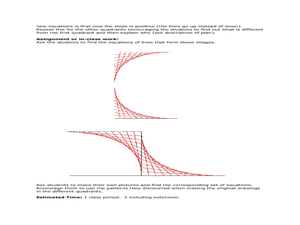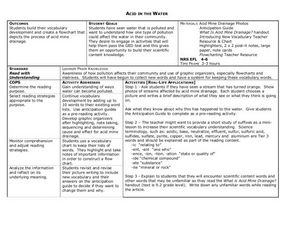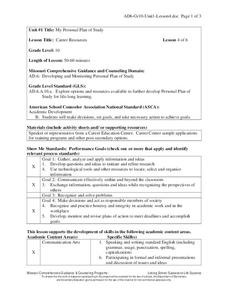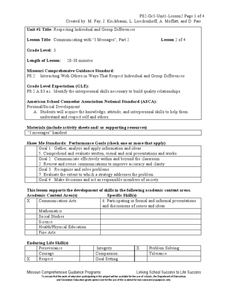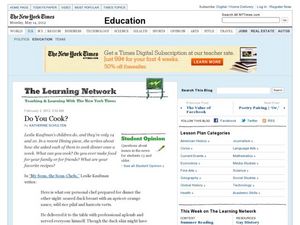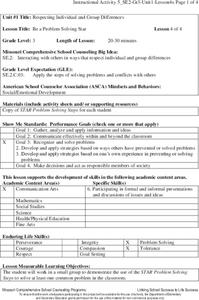Curated OER
Mathematics of Doodles
Students use the slope and y-intercept to graph lines. In this algebra lesson, students graph linear equations and apply it to solving real life problems.
Curated OER
Acid in the Water
Ninth graders learn about the effect pollution has on water and how this affects their community. In this environmental awareness instructional activity, 9th graders expand their vocabulary and create a flowchart that...
Curated OER
Career Resources
Tenth graders explore options and resources available to further develop personal education plans for life-long learning. They listen to a speaker from a local vocational or technical institute. They ask questions of the speaker...
Curated OER
Community Wellness Fair
Twelfth graders list ideas to create a wellness fair. They form student committees to organize times for each class to participate in the fair. Students assist in setting up the fair by putting up tables for the exhibitors, preparing...
Curated OER
Using I-Statements
Fifth graders brainstorm a list of life-changing events. As a class, they practice making I-statements and identify what to avoid when putting them together. To end the lesson, they determine which of their statements can be used in...
Curated OER
Communicating with "I Messages", Part 2
Third graders listen to ways they share their feelings with others. After brainstorming situations where "I messages" would be appropriate, pairs of students write messages from the lists they developed. They discuss how their messages...
Curated OER
Introducing the Idea of "Community"
Students work in groups to define the term "community". They draw on personal experiences and create posters to explain and depict various aspects of community life.
Curated OER
Lonely Heart
Pupils play a game to improve non-verbal communication skills. They each place a playing card on their forehead without looking at the suit then they must form groups of the same suit without speaking. They reflect on the process and...
Curated OER
Children Cooking at Home: Developing Opinions
Excerpts from a New York Times article about children cooking dinner for their family can lead learners to express opinions about taking on real life responsibilities. The story will prompt discussion, but add more questions directed at...
Curated OER
The Very Hungry Caterpillar
Second graders watch a video about Eric Carle before listening to his story entitled, The Very Hungry Caterpillar. They notice how the caterpillar eats its way through the days of the week and they examine the life cycle of the...
Curated OER
Screw It, Let's Do It
Students examine the possible application of the lessons drawn from business life in personal life. They are told that each section of the book has a heading indicationg a lesson Richard Branson has drawn from in his life. Students work...
Curated OER
Environmental Science/Water Pollution
Learners study natural habitats, aquatic life, renewable and non-renewable resources. They discuss conservation efforts for sea otters and desert toad in this units.
Curated OER
Artificial Reef
Students conduct online research to determine how and why artificial reefs are created, and investigate how they benefit marine life and the marine ecology.
Curated OER
Vessels: Then and Now
Students determine the role of vessels in ancient Greek life and identify their modern-day equivalents. They describe the role of resources in ancient Greek everyday life and identify modern-day equivalents to ancient Greek tableware.
Curated OER
Exercise for the Heart
Second graders discuss and understand relationship between physical activity and healthy heart, describe long-term effects of daily physical activity on heart,
and set personal goals for daily participation in physical activities that...
Curated OER
Observing and Drawing Structures of Guppies and Goldfish
Students observe fish and focus on their structures. In this life science lesson, students work in a group and observe guppies and gold fish.
Curated OER
Strategies for Economic Development
Students develop an awareness of the main strategies of development. The limitations of strategies is addressed. The skills of analysis and evaluation in the business environment are developed. The goal of the skills is becoming...
Curated OER
Post-Secondary Choices
Students discuss interests and future goals. After completing a personal preferences handout, students research colleges that are compatible with their interests. They request, in writing, additional information from their selected...
Curated OER
Taking Risks: Drug and Alcohol Abuse
Students discuss a video about drug and alcohol abuse and their connection to risk-taking. They answer questions on a risk factor sheet about the use of tobacco, drugs, and alcohol. They discuss long and short term goals and how not...
Curated OER
Empowering Young People to Repair the World
Students analyze the role of study vs. good deeds in contributing to improving the world. They discuss how study and action are important and consider their obligation to make the world a better place. After discussing the concept of...
Curated OER
Sterotypes
Students participate in a variety of activities in order to explore the concept of a stereotype. The concept of diversity is also mentioned to contrast a stereotype. The goal of the lesson is to create an understanding of how cultures...
Missouri Department of Elementary
Acting Out Respect
Bert and Ernie, Lucy and Ethel ... what makes a great friend? Pupils first learn about the STAR method of problem solving: Stop, Think, Act, Review. Small groups then role play various scenarios to demonstrate respect and compromise in...
Missouri Department of Elementary
Be a Problem Solving Star
Reach for the STARs! Using the resource, scholars review the STAR (Stop, Think, Act, Review) method and discuss how to use it to solve a math equation. Next, small groups collaborate to solve a common problem in the classroom using the...
Missouri Department of Elementary
What are Comfortable (Good) and Uncomfortable (Bad) Feelings?
Two puppets open a discussion about comfrotable and uncomfortable touches. Scholars add to the discussion information they remember from a previous lesson, then delve deep into three problem-solving safety rules, and explore...
